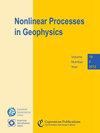使用模型输出统计随机森林的鲁棒天气自适应后处理
IF 2.4
4区 地球科学
Q3 GEOSCIENCES, MULTIDISCIPLINARY
引用次数: 0
摘要
摘要。物理数值天气预报模式会因天气情况而存在偏差和误校正,这使得基于参数回归模型的传统模式输出统计(MOS)框架难以对其进行有效的后处理。因此,最近的许多工作都集中在使用灵活的机器学习方法上,这些方法能够在后处理过程中考虑到额外的天气相关预测因素,而不仅仅是对感兴趣变量的预测。其中一些方法取得了令人印象深刻的结果,但它们通常比传统的MOS需要更多的训练数据,并且不太容易实现和解释。我们提出了MOS随机森林,这是一种新的后处理方法,通过将传统的MOS与称为随机森林的强大机器学习方法相融合,从一组预测因子中估计天气适应的MOS系数,从而避免了这些问题。由于假设的参数基模型包含有价值的先验知识,因此需要更小的训练数据来获得熟练的预测,并且模型结果易于解释。MOS随机森林很容易实现,而且通常工作得很好,即使没有或很少进行超参数调优。对于复杂地形中逐日降水和后处理的困难任务,它们在大多数考虑的站点中优于参考机器学习方法。此外,该方法对于数据大小的变化具有高度的鲁棒性,即使在可用于训练的观测值少于100个时也能很好地工作。本文章由计算机程序翻译,如有差异,请以英文原文为准。
Robust weather-adaptive post-processing using model output statistics random forests
Abstract. Physical numerical weather prediction models have biases and miscalibrations that can depend on the weather situation, which makes it difficult to post-process them effectively using the traditional model output statistics (MOS) framework based on parametric regression models. Consequently, much recent work has focused on using flexible machine learning methods that are able to take additional weather-related predictors into account during post-processing beyond the forecast of the variable of interest only. Some of these methods have achieved impressive results, but they typically require significantly more training data than traditional MOS and are less straightforward to implement and interpret. We propose MOS random forests, a new post-processing method that avoids these problems by fusing traditional MOS with a powerful machine learning method called random forests to estimate weather-adapted MOS coefficients from a set of predictors. Since the assumed parametric base model contains valuable prior knowledge, much smaller training data sizes are required to obtain skillful forecasts, and model results are easy to interpret. MOS random forests are straightforward to implement and typically work well, even with no or very little hyperparameter tuning. For the difficult task of post-processing daily precipitation sums in complex terrain, they outperform reference machine learning methods at most of the stations considered. Additionally, the method is highly robust in relation to changes in data size and works well even when less than 100 observations are available for training.
求助全文
通过发布文献求助,成功后即可免费获取论文全文。
去求助
来源期刊

Nonlinear Processes in Geophysics
地学-地球化学与地球物理
CiteScore
4.00
自引率
0.00%
发文量
21
审稿时长
6-12 weeks
期刊介绍:
Nonlinear Processes in Geophysics (NPG) is an international, inter-/trans-disciplinary, non-profit journal devoted to breaking the deadlocks often faced by standard approaches in Earth and space sciences. It therefore solicits disruptive and innovative concepts and methodologies, as well as original applications of these to address the ubiquitous complexity in geoscience systems, and in interacting social and biological systems. Such systems are nonlinear, with responses strongly non-proportional to perturbations, and show an associated extreme variability across scales.
 求助内容:
求助内容: 应助结果提醒方式:
应助结果提醒方式:


